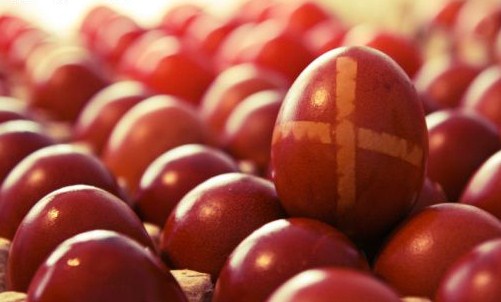We arrive at St. Paul’s Cathedral for the Anastasi around 11:30 to honor Christ’s resurrection. My mother buys the lambadas, candles that signify the light of God. Muffled whispers turn to loud conversation as more flavorful Greeks saturate empty spaces of grass outside the church. I take the lambada unwillingly from my mother’s hand and stand in between my father and my sister. A little before midnight, the priest and his crew of clergymen join us outside. They hold crosses, relics, and a model of post-crucified Jesus. Talking ceases, candles are lit and at midnight everyone sings, “Christos Anesti, ek nekron, thanaton tha…na…ton, Christ has risen from the dead, from the dead, from…the…dead,” crossing themselves with the lambada. I don’t.
I’m not religious. I know how that sounds – cliché, redundant, overheard – but I’m not. It’s not like I lost my faith. I just never hit it off with Him. The rare times you can find me sitting, and reluctantly kneeling and standing in between two pews, I’m strictly thinking about the piece of bread the altar boys give out at the end of the service. Especially during the give us this day our daily bread segment of the Lord’s Prayer. Yeah. Give it to us. And especially during the Anastasi, all I want is for it to finish so I can go eat.
I wake up at 8:30 in the morning and meet my baba in the garage. The man is sporting his usual black sweatpants, and a tucked in white thermal. Headphones are plugged into his ears. His signature look.
“Grab that end of the arne!” My father yells to help him with the lamb as if I wasn’t right next to him. He still thinks he has to shout over the music in his headphones.
“Okay!” I yell back.
We carry the arne through my family room and open the sliding door to my backyard. The strumming of a bouzouki and abrasive stringing of a lira break free from his headphones. I feel the heat of the charcoal that my father has already lit and the smoke from the fire escapes into the crisp, spring morning. We hook each end of the spit onto the mechanized cooker. The chord is plugged in and the lamb starts rotating.
“Poor guy,” I say, my eyes fixated on the animal.
“What! Ti eipes?” My father shouts again.
I don’t respond. Not because I feel like he wouldn’t understand the sympathy I feel for the lamb but because he wouldn’t hear me anyway. I look back before going inside.
My father is hypnotized by the spinning lamb, his head circling with each rotation. He claps his hands, rubs them together and licks his lips like Sylvester seeing Tweety.
“Oh baby! Can’t wait until it’s ready,” he exclaims, his hands separate and one finds its way to his belly, more rubbing. His stomach doesn’t allow compassion.
Hours later, the smell of cooked lamb infiltrates the smoke from the grill, seeping its way up and down Edgewood Drive. I stand on my deck and throw the souvlakia on the barbeque, crack open a Mythos and wait for more family to arrive. The pita bread toasts above the souvlakia and the fire hisses with each splash of oregano, lemon, salt and pepper on the cooking meat. I look over my shoulder at my father standing beside the big, rotating, succulent, seasoned 24-pound lamb down the stairs of my deck.
Despite my earlier commiseration, I stare at the lamb as if I want to put it between two pieces of pita and eat the entire thing in one big sandwich. A couple years ago, we decided against the rotisserie and simply barbecued like it was a regular Sunday. It didn’t feel right. My family has so many memories attached to the food we eat, stories for days about our experiences with the animal. The lamb is the center of our tradition, along with the rest of the tasty food in my kitchen waiting to be devoured. Taking the lamb out of Easter would be like forgetting the memories.
My sister’s fiancé, a non-Greek, once ate a lamb eyeball. The guy simply popped it into his mouth like it was the first M&M in the bag. Everybody gathered around with their iPhones to document the first-time-ever moment.
“Tastes like chicken,” he said, effortlessly chewing the remnants of the eyeball.
That same year, my ex-girlfriend, another non-Greek, could not stand anywhere near the lamb while the rest of the salivating Greeks at my house huddled around the revolving arne. It was her favorite animal, obviously not to eat, but to cuddle up against in stuffed animal form. I secretly told all my relatives and each one tried to get her to come see the arne. A symphony of laughter usually followed.
During one of my teenage years, my theo approached me, “try this,” he said, handing me a fork with a pink piece of meat stuck to it, “it’s the thigh.” I remember how mushy it was, how gamy with each slow, uneasy bite, and how quickly I wanted to forget the taste. “What was it really?” I asked my uncle, searching for other food to mask the taste. He smiled. “The kidney.”
The spit has almost stopped working before, only to be resurrected by the crafty hands of my papou. Our supply of charcoal depleted once, awakening a typical fight between my pops and me over who was supposed to buy extra only to be amended over the clanking of two beers and teeth sinking into meat. We smash red, hard boiled eggs against one another, a game I remember playing when the lamb was monstrous compared to my tiny body. If your egg stays unbroken, you find another person’s to compete with who was just as fortunate to still have a surviving egg. The person whose egg remains unblemished wins.
After years of expressed desire from our parents to marry Greek, my sister and I both brought xseni, or foreigners, to Easter. Both were welcomed with the same love by the family who passes me a tray of stuffed grape leaves across the table. Love of permanence. Not that the lamb solely ushered them into the family, but Easter for Greeks is celebrated like Mardi Gras in New Orleans. The nationalites of our significant others were not presented among the plates of food on the table on my backyard’s deck, open for consumption. I was so used to listening and learning about the complex, tight-knit circle of the Greek Orthodox community. My family now yanked open our oven and unexpectedly began cooking dishes infused with new ingredients.
It’s the flickering flame of the lambada, the echoing eruption of song during the Anastasi, the savory soup that warms our bellies, the colliding cracking of egg shells, but it’s most importantly the lamb everyone comes to see that makes Easter special. The lamb gives my family these stories to tell, bringing everybody together to listen.
Look. I have nothing against religion. I know I don’t cross myself with the lambada or sing when I’m supposed to. But I’ve kept theology out of the kitchen, separate from my culture. “Come on re Demetri, but you’re Greek,” people tell me after hearing how I’ve sinned. Being Greek is looking across the table, filled with Greek food, at my family. Religion is tough to digest. Tradition goes down easier.
 Demetri Raftopoulos is a young writer currently receiving his MFA in Creative Writing at The New School, where he is the program’s event and chapbook coordinator. His writing has appeared in Critical Mass: The Blog of the National Book Critics Circle, The Ink and Code, Thought Catalog, and Sports of New York. He resides in Long Island, with his parents.
Demetri Raftopoulos is a young writer currently receiving his MFA in Creative Writing at The New School, where he is the program’s event and chapbook coordinator. His writing has appeared in Critical Mass: The Blog of the National Book Critics Circle, The Ink and Code, Thought Catalog, and Sports of New York. He resides in Long Island, with his parents.


1 Comment
A humorous reflection of Greek Easter tradition.